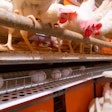
Along with price, consumers weigh egg quality by criteria like traceability, environmental footprint, animal welfare and animal production system.
In a WATT Poultry Chat interview sponsored by DSM, Fernando Cisneros-Gonzalez, Global Manager Solutions Layers at DSM, discusses what consumers look for when selecting eggs, what they expect once those eggs are in the kitchen, and the various qualities that egg producers need to ensure to align with these consumer preferences.
Mark Clements: So you're going to talk to us today about egg quality. So, perhaps we could start with, what is it exactly that the consumer is looking for when taking eggs home?
Fernando Cisneros: There are several considerations in the mind of the consumer like price, egg quality, how the egg is produced in terms of traceability. Environmental footprint that is becoming a huge issue. Welfare, antibiotic free and production system. Of course packaging and branding can't be forgotten either. All of them weigh different, depending on the market and the consumer's background. However, we have to remember that all eggs are nutritious, and a healthy food choice.
Mark Clements: What are the main aspects that we should consider when we're discussing egg quality?
Fernando Cisneros: The consumer prefers a brand of eggs in terms of sensory impressions and nutritional value, while assuming it will be safe to eat. Therefore, the egg industry will look very hard to those two aspects under any production system.
Mark Clements: You mentioned sensory evaluation. What exactly is that?
Fernando Cisneros: Well in the store, the consumer will look for egg size. Shell color: If it's brown or white. Integrity: So you don't see leakage coming from the shell. Cleanliness of the shell that is also very important. Once you take the eggs home, once at home aspects like freshness, yolk color, and absence of off colors will make the cook to look for a different supplier or stick with the same brand.
Mark Clements: What's the single most important factor that farmers should consider to keep the number of saleable eggs at the desired level?
Fernando Cisneros: Integrity is the single and most important factor in qualifying an egg as saleable. Age of the hen is important. In general, hens finish their cycle not because of lack of production, but more because it's eggs become more fragile with age. It has to do with egg shell calcium crystal structure. However, we can influence eggshell integrity, by making sure a non-plasmatic calcium is circulated in order for us to have enough for the uterus to lay the foundation of the egg: the mammillary layer. Gut health and the proper vitamin D3 nutrition are essentials in the process. Besides providing the right amount of calcium and phosphorus in the diet.
Mark Clements: Could you tell us, does DSM have special developments in terms of egg quality evaluation?
Fernando Cisneros: Well, thanks for the question. Yes, we have the standard on egg yolk color in the YolkFan. The YolkFan measures the intensity of the yolk pigmentation is scale of one to 16 and is used on a global scale by the industry. The YolkFan comes in its traditional paper fan produced in Germany and the innovative digital YolkFan that is available to DSM customers around the globe and allow the farmers to quantify egg color, follow different farms and houses, get recommendations on egg pigmentation and understand and monitor changes due to diet, health, or the environment.
This transcript edited for length and clarity.


















